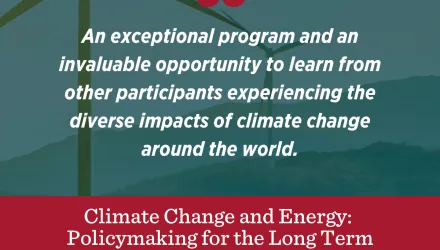Equity and Climate Policy: An Allocation Method Based on Individual Emissions
The speakers will present a new framework for allocation of a global carbon reduction target among nations, in which "common but differentiated responsibilities" refers to the emissions of individuals, rather than of nations. Their scheme is designed to blend parsimony, fairness, and pragmatism - one rule for everyone. All those with the same emissions are treated equally, wherever they live. "High emitters" are defined as those whose emissions exceed a universal individual emissions cap, which is derived transparently from a global emissions target. National targets are derived by summing the excess emissions of all "high emitter" individuals in a country. Nations are free to determine the policies they need to meet these targets, but policies that pursue emissions reduction across a wide swath of a country's economy is preferable to those that address only the emissions of the country's high emitters.
Please join us! Coffee and tea provided. Everyone is welcome, but admittance will be on a first come-first served basis.




